Reviewed by Dr. Fiona Lee
Ensuring your dog’s diet is safe and nutritious is a top priority for any pet parent. While many human foods can be healthy additions to a dog’s diet, others pose significant risks, with some being toxic even in small amounts. With hundreds of thousands of pet poisonings occurring annually in the United States, understanding “What Meat Is Dangerous For Dogs” and other hazardous human foods is crucial for your furry friend’s well-being. This guide aims to provide you with essential information to keep your canine companion safe and healthy, helping you distinguish between safe treats and dangerous substances.
Why Certain Foods Are Toxic to Dogs
Canine digestion and metabolism are distinct from human systems, allowing us to safely consume many foods that are harmful to dogs. A dog’s body processes certain substances very differently. For instance, dogs metabolize the theobromine and caffeine found in chocolate much slower than humans, leading to a rapid accumulation of these substances in their system, which can be fatal. Similarly, while the fleshy parts of some fruits are safe, the pits or seeds can contain cyanide, which is problematic in large quantities and can also cause digestive obstructions.
Food toxicity can also vary based on a dog’s size, breed, and overall health condition. Therefore, always consult your veterinarian if you have any questions about specific foods your dog should not eat.
Dangerous Meats for Dogs
When considering “what meat is dangerous for dogs,” two main categories stand out: fatty cuts of meat and raw or undercooked meats. These can lead to severe health issues and should always be avoided.
Fatty Cuts of Meat, Ham, and Poultry Skin
Items like chicken and turkey skin, ham, and other fatty cuts of meat are highly dangerous for dogs due to their elevated fat content. Consuming these can trigger acute pancreatitis, a life-threatening illness characterized by severe complications. Pancreatitis is an inflammation of the pancreas, which can be extremely painful and often requires intensive veterinary care.
Furthermore, turkey and chicken bones, often found in cooked meats, pose a significant choking hazard. If ingested, these bones can splinter, causing obstructions in the bowels or damaging the stomach and intestines. In severe cases, splintered bones can even puncture the digestive tract, leading to a fatal abdominal infection. Therefore, it’s best to discard these fatty and bony parts rather than offering them as treats.
Raw or Undercooked Meat
Never feed your dog raw or undercooked meat. This includes beef, poultry, and any other type of meat that hasn’t been thoroughly cooked. Raw meat can harbor dangerous bacteria such as Salmonella and E. coli, which are harmful to dogs just as they are to humans. These bacteria can cause severe gastrointestinal illness, including vomiting, diarrhea, and lethargy.
In addition to bacterial contamination, raw meat often contains bones, which can present the same choking and internal injury risks as cooked bones. Avoiding raw meat entirely is the safest approach to protect your dog from potential bacterial infections and physical harm.
For more information on what foods are generally safe for your dog, read our guide on what food is ok for dogs to eat.
Other Common Foods Dogs Cannot Eat
Beyond dangerous meats, numerous common household foods are toxic or harmful to dogs. Being aware of these can prevent accidental poisonings, which contribute significantly to the more than 401,500 pet poisonings annually. While this is not an exhaustive list, it covers some of the most critical foods to avoid.
1. Alcohol
Due to their smaller size, alcohol can have a much more severe and deadly effect on pets compared to humans. Even minimal amounts of alcohol can cause harm, with smaller animals being particularly vulnerable. Symptoms of alcohol poisoning in dogs mirror those in humans, including vomiting, breathing difficulties, coma, and even death.
2. Apple, Apricot, Cherry, and Plum Seeds/Pits
While the fleshy parts of apples are generally safe, the core and seeds are not. Apple seeds contain cyanide, and though small amounts might be tolerated, it’s safest to avoid them entirely. Similarly, apricot, cherry, peach, and plum seeds and pits also contain cyanide, which can lead to severe symptoms like vomiting, irregular heartbeats, seizures, coma, and even death. This is due to cyanide’s interference with red blood cells’ ability to carry oxygen. Additionally, pits can cause digestive obstruction and diarrhea.
3. Avocado
Avocados are not a good choice for dogs. Historically, some dogs have died from myocardial damage after consuming avocados, though this specific outcome has not been widely replicated. More commonly, the large, intact pit of an avocado can cause a gastrointestinal tract obstruction if swallowed. It is best to avoid feeding avocados to your dog.
4. Broccoli
Broccoli contains isothiocyanates, which can be harmful to pets in very large doses. Although small quantities might be acceptable occasionally, numerous healthier alternatives exist. Broccoli stalks can also pose a choking hazard or cause an obstruction if lodged in a dog’s throat.
5. Caffeine and Coffee Grounds
Caffeine contains methylxanthines, compounds that can cause potentially fatal symptoms such as diarrhea, vomiting, seizures, and an irregular heartbeat. Ingesting coffee grounds or high-caffeine drinks can cause a dog’s heart to race, leading to tremors, arrhythmia, and difficulty breathing.
6. Chocolate
Chocolate toxicity is a frequent cause of pet poisoning. Chocolate contains theobromine, a lethal component for dogs; the darker the chocolate, the higher the theobromine content. Chocolate also contains caffeine, and some sugar-free varieties may contain xylitol, both highly toxic to dogs. Dogs and cats cannot metabolize chocolate as effectively as humans. Symptoms can include hyperactivity, vomiting, diarrhea, pancreatitis, abnormal heart rhythm, and seizures. Contact your vet immediately if your dog ingests any amount of chocolate.
7. Grapes and Raisins
Grapes and raisins are extremely dangerous to dogs. These fruits can cause serious problems like acute kidney failure due to tartaric acid, which is toxic to a dog’s kidneys. Even a few bites can wreak havoc. Symptoms of grape or raisin poisoning include vomiting, diarrhea, loss of appetite, and changes in urination, ranging from increased frequency to complete absence.
8. Macadamia Nuts, Almonds, and Pistachios
Macadamia nuts can cause dogs to suffer from weakness, overheating, and vomiting. The exact mechanism of toxicity is still somewhat a mystery, but these nuts are considered toxic. As few as six nuts can cause severe poisoning in a small dog. Other nuts like pistachios and almonds can be choking hazards, especially if flavored or spiced.
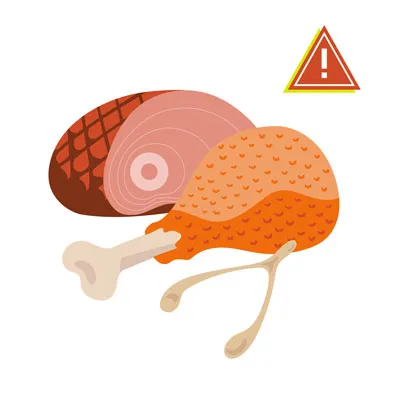 Chicken and turkey skin, ham, and other fatty cuts of meat that are dangerous for dogs
Chicken and turkey skin, ham, and other fatty cuts of meat that are dangerous for dogs
9. Milk and Dairy Products
Dairy products should be given with caution. While some dogs tolerate milk and dairy well, many are lactose intolerant or allergic, experiencing diarrhea and gas from cow’s milk. Ice cream is particularly bad due to high sugar and fat content. Small amounts of low-fat cheese might be acceptable as a rare treat, but high-fat varieties should be avoided.
10. Mushrooms
It’s safest to avoid feeding your dog mushrooms. Wild mushrooms can contain various toxins that may lead to kidney and liver failure, vomiting, diarrhea, hallucinations, and damage to red blood cells. Even store-bought white mushrooms, while generally considered safe if thoroughly washed, are best avoided in favor of other treats.
11. Nutmeg and Cinnamon
Nutmeg should never be fed to dogs as it can cause hallucinations and severe vomiting. The compound myristicin in nutmeg is particularly potent in high doses or for small dogs. If your dog consumes any amount of nutmeg, contact your veterinarian immediately. Cinnamon, while not toxic, can irritate a dog’s mouth and may lead to low blood sugar, which can have serious health implications.
12. Onions, Garlic, Chives, and Leeks
Members of the allium family, including onions, garlic, chives, and leeks, are highly unsafe for dogs. These contain sulfoxides and disulfides, which can damage red blood cells and cause anemia in both dogs and cats. Onion and garlic powders are often hidden in prepared foods, so always check labels. All allium plants can cause potentially fatal anemia, with certain Japanese breeds like Akitas and Shiba Inus being particularly sensitive, though dangerous for all dogs.
13. Salt
Excessive salt intake can disrupt the fluid balance in a dog’s cells, leading to tremors, seizures, diarrhea, or even a coma. Whether it’s rock salt, homemade play dough, or potato chips, refrain from giving in to their begging, as too much salt jeopardizes their health.
14. Spicy Food
Keep all spicy foods away from your pup. Hot, spicy ingredients can cause vomiting, stomach ulcers, or diarrhea, leading to pain for your dog and potentially costly emergency vet visits.
15. Sugar-Free Gum and Candy (Xylitol)
Xylitol is an artificial sweetener found in many human foods, including sugar-free gum, candy, and baked goods. In dogs, xylitol causes a rapid and dangerous drop in blood sugar, leading to weakness and seizures. Some dogs may also develop liver failure. Poisoning cases involving xylitol are on the rise, and as little as five pieces of gum can be fatal to a 65-pound dog.
16. Tomatoes and Raw Potatoes
Tomatoes and potatoes fall into a “safe in some forms, unsafe in others” category. A ripened red tomato is generally fine, but the green parts of the tomato plant and unripe green tomatoes contain solanine, which is toxic to dogs. Similarly, baked or boiled potatoes without additives are generally safe in small amounts. However, raw potatoes also contain solanine and are toxic.
17. Tobacco
Tobacco and nicotine-containing products are dangerous and unhealthy for dogs. Exposure can cause vomiting, diarrhea, rapid breathing, agitation, abnormal heart rate, wobbliness, weak muscles, blood pressure fluctuations, seizures, and tremors. More significant exposure can lead to blue gums and coma, potentially becoming fatal. If your dog ingests any tobacco, seek immediate veterinary attention.
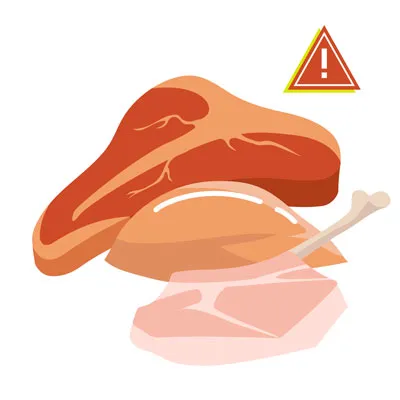 Raw meat can contain harmful bacteria and bones that are dangerous for dogs
Raw meat can contain harmful bacteria and bones that are dangerous for dogs
18. Yeast and Raw Dough
Yeast and raw dough are unsafe for dogs for multiple reasons. Raw dough can expand in a dog’s stomach, causing severe pain, and potentially life-threatening gastric torsion or rupture. Additionally, the yeast and sugar in raw dough can ferment, producing alcohol and leading to alcohol toxicity. This is a medical emergency requiring immediate intervention.
19. Rhubarb
Rhubarb, commonly used in desserts, is not safe for pets. Its leaves contain soluble calcium oxalate crystals. Ingested in sufficient quantities, these can bind with calcium in the body, causing a dangerous drop in calcium levels and potentially leading to renal (kidney) failure. Symptoms include tremors, weakness, drooling, bloody urine, changes in thirst and urination, and vomiting.
20. Star Fruit
Similar to rhubarb, star fruit also contains soluble calcium oxalate crystals and should not be given to dogs.
21. Flavored Water and Seltzer Water
It’s best to stick to fresh, clean water for your dog. Flavored and seltzer waters can contain added sugars, salts, or artificial sweeteners that are dangerous. While plain seltzer water might be acceptable in small amounts in an emergency, it can cause gas and bloating. Always prioritize plain water.
For more detailed advice on specific foods to avoid, particularly for small breeds, explore our article on what not to feed a yorkie.
Safe Foods for Dogs
While the list of dangerous foods can seem daunting, many human foods are perfectly safe and healthy for dogs. These can be wonderful treats when given in moderation and prepared correctly. Some popular and safe options include lean cooked meats (without skin, fat, or bones), certain fruits, and vegetables. To learn more about beneficial foods, check out what is good food for dogs to eat.
1. Apples, Oranges, and Bananas
The fleshy parts of apples, when cored and seeded, are safe and enjoyable for dogs. Oranges are safe in small amounts, and bananas (peeled and in moderation) also make a tasty treat.
2. Blueberries and Blackberries
Blueberries are excellent treats, packed with antioxidants, fiber, phytochemicals, and vitamin C, all beneficial for your dog’s health.
3. Cantaloupe, Mango, Peaches, Pears, Pineapples, and Watermelon
Many fruits can be safely enjoyed by dogs. Cantaloupes are a great start. Watermelon, with rinds and seeds removed, is hydrating and refreshing. Mangoes, peaches, pears, and pineapples are also safe in moderation, provided pits and cores are removed. If you have a puppy, you might be wondering what does a month old puppy eat, and these fruits can be small, healthy additions after they are older.
4. Carrots, Cucumber, and Celery
These “three C’s”—carrots, cucumbers, and celery—are excellent low-calorie options, especially for overweight dogs. Carrots offer a satisfying crunch, celery can help with bad breath, and cucumber slices provide vitamins and minerals with minimal carbs and fats. Learn more about fruits your dog can have in our article on what fruits can dogs have and not have.
5. Cheese
A little cheese can be an acceptable treat if your dog isn’t lactose intolerant. Opt for lower-fat varieties like mozzarella in small quantities, and always consult your veterinarian for the best type.
6. Eggs
Fully cooked eggs, such as scrambled eggs, can be a tasty and digestible treat. They can help soothe an upset stomach and provide a good source of protein.
7. Peanuts, Peanut Butter, and Cashews
Peanuts and cashews are safe in small, unsalted, unflavored quantities due to their high-fat content. Peanut butter is also a popular high-protein treat in moderation, but always choose unsalted, xylitol-free varieties.
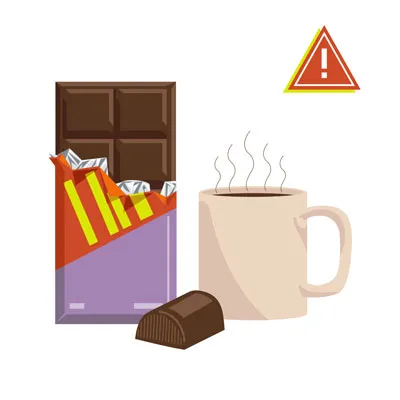 Chocolate bars and cocoa powder, highly toxic to dogs
Chocolate bars and cocoa powder, highly toxic to dogs
8. Popcorn and Corn
Air-popped, unsalted, and unbuttered popcorn can be a fun treat. Ensure all unpopped kernels are removed to prevent choking. Corn (off the cob) is also acceptable without butter, salt, or spices.
9. Coconut and Honey
Small amounts of coconut (including milk and oil) are generally fine for dogs and may even help with allergies due to lauric acid. However, some dogs may experience an upset stomach. Avoid coconut water and the fibrous shell. Honey in moderation is also safe and offers beneficial vitamins and minerals.
10. Shrimp and Fish
Plain, fully cooked shrimp, with shells, heads, tails, and legs removed, is a good option. Avoid seasoned or buttered varieties. Fish, especially salmon and sardines, is also permissible if plain, fully cooked, and boneless. Limit fish to no more than twice a week. Plain canned tuna packed in water is safe in moderation.
11. Turkey
Cooked turkey meat, with the skin, fat, and bones removed, is a healthy and safe source of protein. Offer small, plain bites as a treat, avoiding any seasoned or salted turkey.
12. Grains, Wheat, and Quinoa
Small amounts of wheat or other grains are generally fine, and quinoa is a healthier filler option. Monitor for any allergic reactions.
13. Green Beans
Many dogs enjoy green beans, whether raw, steamed, or canned. They are safe, tasty, and healthy. Choose plain green beans without added spices, oils, or salt, and cut them into small pieces to prevent choking.
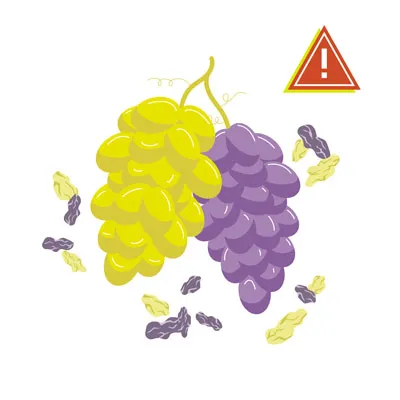 Grapes and raisins, small fruits that are extremely poisonous to dogs
Grapes and raisins, small fruits that are extremely poisonous to dogs
What Dogs Are Most at Risk if They Consume Toxic Foods?
While all dogs should avoid toxic foods, certain groups are at higher risk:
- Small breeds vs. large breeds: Smaller dogs are more vulnerable due to their lower body weight, especially with substances like chocolate.
- Puppies: Younger dogs have less developed digestive and immune systems, making them more susceptible to certain substances, including raw food.
- Elderly dogs: Older dogs may face higher risks due to pre-existing health conditions.
- Dogs with pre-existing conditions: Conditions like diabetes or kidney disease can significantly increase a dog’s risk from toxic foods.
How To Prevent Dogs from Eating Toxic Foods
Accidents happen, but proactive measures can significantly minimize the risk of your dog ingesting unsafe human food.
1. Store Foods Out of Reach
Ensure all toxic foods are inaccessible to your dog. Keep dangerous items on high shelves or securely locked away in cabinets that your pup cannot open.
2. Avoid Feeding Dogs from Your Plate
Resist the urge to feed your dog from your plate or while cooking in the kitchen, even if it’s just a small treat. It’s safest to only give your dog treats specifically made for canines.
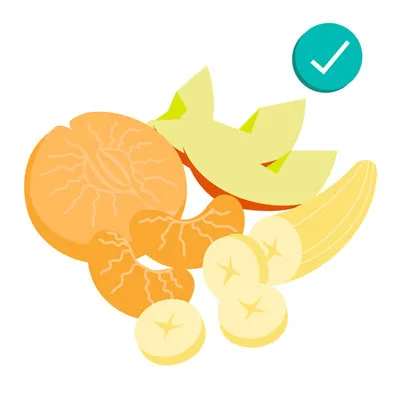 Bowl of apples, oranges, and bananas, some fruits safe for dogs when prepared correctly
Bowl of apples, oranges, and bananas, some fruits safe for dogs when prepared correctly
3. Educate Family Members and Guests
Inform family members, including children, and guests about the importance of not sneaking any food to your dog, no matter how tempting.
4. Be Careful During Holidays
Exercise extra caution during holidays. The bustling atmosphere can make it easy to lower your guard while preparing food, increasing the risk of accidental ingestion. If an accident does occur despite your precautions, be prepared to act quickly. Keep contact information for 24/7 emergency veterinarians and poison control readily available.
What To Do if Your Dog Eats Something Toxic
If your dog consumes toxic food, immediate action is crucial. Familiarize yourself with the symptoms of food toxicity, which vary depending on what was ingested, but can include listlessness, distress, pain, vomiting, bloody stools, or a bloated and hard stomach. If you notice these symptoms, follow these steps:
- Call your veterinarian or poison control immediately. Timing is critical, as prompt treatment usually leads to more successful outcomes and shorter hospital stays.
- Be prepared with information. Provide details such as the type of food eaten, the estimated amount consumed, and the time of ingestion.
- Avoid home remedies. Do not attempt home remedies, such as inducing vomiting, unless specifically instructed by your veterinarian, as remedies can vary depending on the toxin and some interventions can be harmful.
Conclusion
Navigating the world of human foods for your dog can be complex, especially with concerns like “what meat is dangerous for dogs” and other common household toxins. By following this guide and remaining vigilant, you can significantly reduce the risk of your beloved companion encountering harmful substances. While dogs sometimes have indiscriminate tastes, your careful attention to their diet is their best protection.
Fortunately, there’s a wide array of safe and healthy foods that your dog can enjoy. Discover which ones your dog loves from our list and offer them as rewarding treats. If you ever have any doubts about a particular food, always consult your veterinarian for expert advice. Prioritizing your dog’s diet is key to their long-term health and happiness.
References
- “Top 10 dog poisons,” Hilary Parker (5/2023), WebMD, https://www.webmd.com/pets/dogs/top-10-dog-poisons
- “What happens if a dog eats chocolate?” (10/2023), Colorado State University, https://vetmedbiosci.colostate.edu/vth/animal-health/why-is-chocolate-bad-for-dogs/
- “Fruits and vegetables dogs can or can’t eat,” (3/2024), American Kennel Club, https://www.akc.org/expert-advice/nutrition/fruits-vegetables-dogs-can-and-cant-eat/
- “What to do if your dog drinks alcohol,” Jerry Klein (7/2023), American Kennel Club, https://www.akc.org/expert-advice/vets-corner/is-alcohol-dangerous-for-dogs/
- “Can dogs eat apples?” Hector Joy (12/2022), PetMD, https://www.petmd.com/dog/general-health/can-dogs-eat-apples
- “Can dogs eat plums?” Katie Koschalk (7/2023), Chewy, https://be.chewy.com/nutrition-pet-diet-tips-can-dogs-eat-plums/
- “Avocado (Persea spp) Toxicosis in Animals,” Cristine Hayes (9/2024), Merck Veterinary Manual, https://www.merckvetmanual.com/toxicology/food-hazards/avocado-persea-spp-toxicosis-in-animals
- “People foods to avoid feeding your pets,” (n.d.), ASPCA, https://www.aspca.org/pet-care/animal-poison-control/people-foods-avoid-feeding-your-pets
- “People foods dogs can and can’t eat,” (3/2024), American Kennel Club, https://www.akc.org/expert-advice/nutrition/human-foods-dogs-can-and-cant-eat/
- “Can dogs eat nuts?” Amanda Ardente (1/2023), PetMD, https://www.petmd.com/dog/nutrition/can-dogs-eat-nuts
- “Can dogs drink milk?” Sandra C. Mitchell (1/2024), PetMD, https://www.petmd.com/dog/nutrition/can-dogs-drink-milk
- “Can dogs have nutmeg?” Barri J. Morrison (11/2023), PetMD, https://www.petmd.com/nutmeg-safe-dogs
- “Onion, garlic, chive, and leek poisoning in dogs,” Renee Schmid et al. (2024), VCA Animal Hospitals, https://vcahospitals.com/know-your-pet/onion-garlic-chive-and-leek-toxicity-in-dogs
- “Can dogs eat tomatoes?” Anna Burke (10/2024), American Kennel Club, https://www.akc.org/expert-advice/nutrition/can-dogs-eat-tomatoes/
- “Can dogs eat potatoes?” Katherine Ripley (11/2023), American Kennel Club, https://www.akc.org/expert-advice/nutrition/can-dogs-eat-potatoes/
- “What to do if your dog eats a cigarette butt,” (6/2023), American Kennel Club, https://www.akc.org/expert-advice/health/dog-ate-cigarette-butt/
- “Dough & dogs: Why it’s bad and what you can do,” Lisa Goldstein (7/2024), Preventive Vet, https://www.preventivevet.com/dogs/dough-is-toxic-to-dogs
- “Rhubarb,” (n.d.), Pet Poison Helpline, https://www.petpoisonhelpline.com/poison/rhubarb/
- “Can dogs drink carbonated water?” Heather Logue (n.d.), Rover, https://www.rover.com/blog/can-dogs-drink-carbonated-water/
- “What fruits can dogs eat?” Ellen Malmanger (2/2024), PetMD, https://www.petmd.com/dog/nutrition/what-fruits-can-dogs-eat
- “Can dogs have green beans?” Anna Burke (8/2022), American Kennel Club, https://www.akc.org/expert-advice/nutrition/can-dogs-have-green-beans/
- “About pet food safety,” (4/2024), CDC, https://www.cdc.gov/healthy-pets/about/pet-food-safety.html
